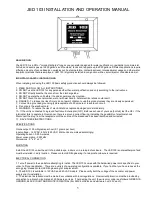
HD1492 HD Encoder Frame Card
Format
and
Ending
describe the packet’s duration. A Format value of
RE indicates an indefinite or integer duration, and a value of EL indi-
cates an Elapsed Time duration. Ending displays the duration value.
Priority
displays the packet’s Priority rating. Packets with smaller nu-
merical priorities go out more frequently than packets with larger nu-
merical priorities, with an approximately inverse proportional relation-
ship between numerical Priority and insertion frequency.
Frames
displays the number of frames the packet occupies. Larger
packets take up more frames and more bandwidth.
Source
indicates whether the packet is locally inserted (Loc) or up-
stream regenerated (Up).
A report on an individual packet includes the packet’s hex byte represen-
tation, decoded content for common packets, and checksum in addition
to the above information.
Delete XDS Packet:
<CTRL+A>P Packet <ENTER>
Deletes the packet of the specified Class and Type from the XDS queue.
If the packet is a Program Name or Program ID packet, all other program-
specific packets will also be deleted, and the Encoder will insert a Clear
packet for downstream databases and decoders.
Delete XDS Queue:
<CTRL+A>L -all <ENTER>
Deletes all packets in the XDS queue.
Block Upstream XDS:
<CTRL+A>T -Class00 <ENTER>
End Blocking:
<CTRL+A>T Class00 <ENTER>
Blocks all incoming packets of the specified Class. Entering all instead of
Class00 as the parameter will cause all upstream packets to be blocked.
Omitting the Class parameter will cause the block/pass status for each
Class to be reported.
Example:
<CTRL+A>T -0100 <ENTER>
blocks all upstream XDS
packets in the Current Program Class.
<CTRL+A>T 0100 <ENTER>
will resume normal XDS operation.
29









































